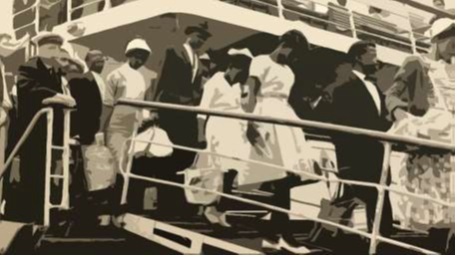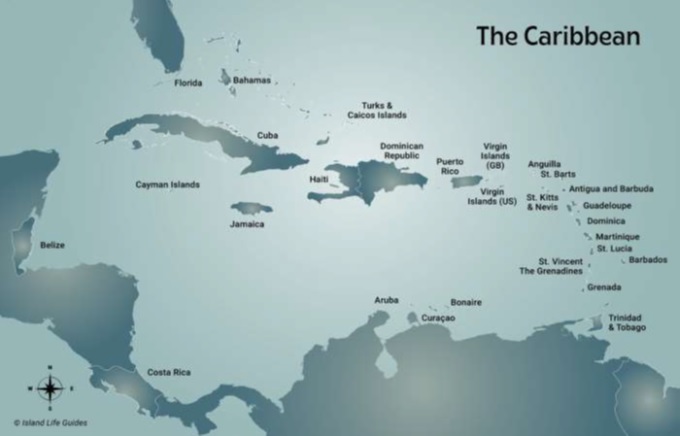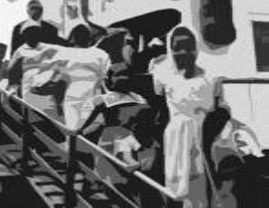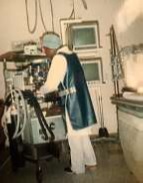Service of the Word Windrush 75th Anniversary – Live Streamed – Black History Sunday, 8 October 2023
Led by Revd George Mwaura
and Revd Ernesto Lozada-Uzuriaga

Those who travelled on the Empire Windrush in May/June 1948, akin to those who travelled to Britain from the Caribbean afterwards, did so on British passports. They were ‘migrants’ only in the sense that they were travelling from one part of the British Empire to the Metropolis, and were doing so with a myriad of aims. For some, it was to rebuild a war-torn Britain – the Motherland – a country that a few had fought to defend during the Second World War. Some joined the newly established National Health Service and others found work on London Transport and in other areas of industry.
However, it would be true to say that they all faced a welcome that was as warm as a typical afternoon in January. Yet, although most struggled due to the racism and prejudice in Britain at that time, many of these trailblazers thrived by the grace of God, sheer hard work, and their Caribbean resilience.
Yet, we need to remember those whose dreams were thwarted by hatred and bigotry as we consider those who fought with their white counterparts in those days to end it. This anniversary is an opportunity to remember that history, but also to acknowledge those who lost their lives as a result of the racial hatred, as well as those whose lives and livelihoods have been threatened by the ongoing Windrush Scandal.

Gathering Music
Welcome
We ought to know
that God is a God of all in the heavens and on the earth.
We need to know
God brings oppressors to their knees.
We know
that we are counted among the stars and that we matter.
We do know
that we are not alone: so we come to be renewed, we come in hope.
You are welcome here!
[Silence]We are many, we are one, born here and born there.
Let each gift we embody/bring, be named, shared, and honoured.
Come, meet and greet the Divine in each other.
Let’s be many; let’s be one.
Gathered here, coming from there and scattered elsewhere:
we are many, we are one.
Let us celebrate. Let us worship
Hymn: Amazing grace
Amazing grace! How sweet the sound
that saved a wretch like me.</span
I once was lost, but now am found,
was blind, but now I see.
’Twas grace that taught my heart to fear,
and grace my fears relieved;
how precious did that grace appear
the hour I first believed.
Through many dangers, trials and snares
I have already come.
’Tis grace has brought me safe thus far,
and grace will lead me home.
When we’ve been here ten thousand years
bright shining as the sun,
we’ve no less days to sing God’s praise
than when we first begun.
Amazing grace! How sweet the sound
that saved a wretch like me.
I once was lost, but now am found,
was blind, but now I see.
John Newton (1725–1807)
CCL31580
Prayer of the Week
Let us pray, conscious that our prayer gives the Spirit a way of breaking into word and song
unique in all the universe,
so, for the words and songs within each of us, we give thanks.
Let us pray: believing we are bearers of a treasure, the Spirit of Life blessing us with a variety of gifts,
so, for the treasures we each bear, we give thanks.
Let us pray: mindful of God in Christ at work in our lives and of what may be possible,
so, we let go, allowing the Spirit to work freely in each of us.
Let us pray: inviting the Spirit of life, love, and goodness to move freely in our words and in our actions,
become in our lives the way to what we need, to what we can become,
and what we can do. In the name of Christ!
Amen
The Mother Country Called – They Came
By Glynne Gordon-Carter
They came from the British West Indies, armed with their British passports, in response to the cry for more workers in post-war Britain. The British-style education in the colonies included the teaching of English language, English literature, British history and geography, so their upbringing was based on British traditional culture. Consequently, people who were coming to work for Britain regarded that as ‘coming home.’ Even youngsters wanted to fight for the mother country. The slogan was ‘England calls for our service and we are ready to go.’
Some also left their islands and came to Britain in order to get away from high unemployment and low wages as ‘the “motherland” offered them a gleam of hope’. (Fryer) A small number of travellers on the Windrush came to study and return to their countries. My uncle R.O.C. White studied law at one of the Inns of Court and returned to Jamaica. He retired as a High Court judge in the 1980s
In 1998, on the fiftieth anniversary of the arrival of SS Empire Windrush from Jamaica to Britain, in Forty Winters –Memoirs of Britain’s Post-War Caribbean Immigrants, Sam King comments: ‘As we got closer to England there was great apprehension on the boat because we knew the Authorities did not want us to land. I got two RAF wireless operators to play dominoes outside the radio room on the ship so we would keep informed of the messages coming in. We heard there was consternation in Parliament and that newspapers like the Daily Graphic and the Express saying that we should be turned back. It was a Labour government and the Colonial Secretary Creech-Jones who said, ‘These people have British passports and they must be allowed to land.’ But then he added. ‘There’s nothing to worry about because they won’t last one winter in England.’ King added, ‘It gives me some satisfaction to be able to repeat his words forty winters later.’
Nurses were recruited from British Guiana and other Caribbean territories. Fryer commented, ‘A Tory Health Minister (Enoch P0well) welcomed West Indian nurses to Britain.’ Post-war immigrants in Britain helped to fill vacancies mainly in health, transport, manufacturing, hotel, and the restaurant industries.
On arrival in Britain, black people experienced a great deal of racial discrimination in their daily lives, in housing signs were commonly displayed: ‘No blacks, no Irish, no dogs’. They also suffered racial discrimination in education, health, the criminal justice system; and employment (some were denied jobs for which they were qualified).
The churches were no exception, as they also displayed racist attitudes to the immigrants. Note the comments from a member of the African & Caribbean Elders Society: ‘In the Caribbean, the church has always been a central part of our lives, spiritually, educationally, and socially. In Britain we were disillusioned to find the churches unwelcoming and even embarrassed by our attendance. We were made to feel intruders in God’s house.’ In fact, many were made so unwelcome that they never returned; often they were told to find another church. This blatant racism was experienced by many in the traditional denominations, whether they were Roman Catholics, Methodists, Baptists, or Anglicans. Bishop Wilfred Wood remarked, ‘having come from countries with a high proportion of church attendance, it would be natural to suppose that a first inclination of the newly arrived immigrants would be to seek out a church. The Church it may be thought would provide the natural link between them and the community into which they had moved. The Church would provide the one ‘known’ among a multitude of ‘unknowns’. In the Caribbean, they were used to worship in Church where the clergy and leadership were English and white, and so anticipated nothing but acceptance and even welcome in churches in Britain.’ In his book entitled A Different Hunger Sivanandan comments, ‘The message that was generally percolating through to the children of the mother country was that their labour was wanted, not their presence.’
Excerpts from An Amazing Journey; The Church of England’s response to institutional racism
Borrowed Sons
By Maureen Onwunali
Stanza 1: Coming
Read by Rodney Hodge
75 years ago
The mother country buries her fallen sons in barren soil under newspaper-grey skies
With seeds sown in soot and sorrow.
Meanwhile
On the other side of the world,
In a type of place where they’ve managed to paint colour over a dark history,
Managed to squeeze sugar cane-sweetness from a bitter past,
Another mother says goodbye to her own sons.
Surrogacy refers to the practice whereby a woman delivers a child on behalf of another.
In June 1948,
With open arms and a warm smile,
this motherland would soon welcome Britain’s call for the fruit of another mother’s labour.
Her sons.
Testimony
 My name is Rodney, and I was born in the UK. My parents were from Anguilla, the most northerly of the Leeward Islands, in the Caribbean. It is still a British Overseas Territory, and still probably, one of the best kept secrets of the Caribbean! During the Second World War, Anguilla was never called upon for its war efforts. However, many were ready to fight for Great Britain, if called. But, from the mid‑1950s through to the 1960s, there was a call for labourers and women to train as nurses. And so they came – with Methodist and Anglican values. They were so young; many in their late teens and early twenties. They came to work, and work was plentiful.
My name is Rodney, and I was born in the UK. My parents were from Anguilla, the most northerly of the Leeward Islands, in the Caribbean. It is still a British Overseas Territory, and still probably, one of the best kept secrets of the Caribbean! During the Second World War, Anguilla was never called upon for its war efforts. However, many were ready to fight for Great Britain, if called. But, from the mid‑1950s through to the 1960s, there was a call for labourers and women to train as nurses. And so they came – with Methodist and Anglican values. They were so young; many in their late teens and early twenties. They came to work, and work was plentiful.
Many Anguillians settled in Slough, Berkshire, and there is still a noticeable community today. Some refer to Slough as Little Anguilla. Within Slough Trading Estate (the largest industrial estate in Europe), there were hundreds of businesses; some small, medium, and large. There were food factories, equipment manufacturing firms, factories which made household products – all requiring operatives on a production line.
Typical working terms of employment were twelve-hour shifts and working six days a week. As young intelligent adults, with high aspirations on coming to the mother country, such working conditions they were offered left no opportunity to study for further education. Some women were fortunate to train as nurses, but the pay was lower than factory workers, and they were favoured to undertake the menial tasks. But they all worked hard, saved their money, married, bought their own house, raised a family – life happens.
Now sixty-plus years have seen four generations of my family circle in the UK. The first generation are now approaching, or are into their eighties. A sobering fact is that Slough cemetery is also testament to the lives of many, now deceased. The Methodist and Anglican churches in Slough may not be as full as they were in the 1950s and 60s, but it is at times of funerals. I realise that faith remains in the hearts of the next generation.
Borrowed Sons
By Maureen Onwunali
Stanza 2: Staying
Read by Martha George
Soon the Windrush generation will learn that there is nothing common
about the Commonwealth in this land of proclaimed greatness.
This furrowed brow of a country
Here, these borrowed children,
with their vibrant culture cross-stitched into the linings of their suits,
will bring colour back to these streets of concrete.
They nursed your old, drove your busses,
produced your metal, mopped your offices, rebuilt your roads,
cleaned your streets, and taught your children
Overqualified and underpaid, they still built back this Britain brick by brick.
In the hope that this mother country would soon recognise them as her own.
That they too may inherit her greatness.
Testimony
Called to Serve
It necessary to support those who answered the call to assist when help was needed.
 My aunts and uncle came to the UK in the 1950s; one of my aunts’ husband came in 1942. As a British citizen, I came to the UK from the Caribbean Island of St Lucia, a British colony, in the 1970s, at the request of the General Nursing Council, because of my nursing career. I am a qualified Registered Nurse, a qualified Midwife; I went on to specialise in diagnostic and investigative procedures. It was not my intention to remain in the UK; because of the shortage of nurses in the UK, I was persuaded to stay on. I am happy to have served this country, which was and still is dear to my heart. We came when called to give the best of ourselves to others; it is the most generous thing to give help where and when help is needed.
My aunts and uncle came to the UK in the 1950s; one of my aunts’ husband came in 1942. As a British citizen, I came to the UK from the Caribbean Island of St Lucia, a British colony, in the 1970s, at the request of the General Nursing Council, because of my nursing career. I am a qualified Registered Nurse, a qualified Midwife; I went on to specialise in diagnostic and investigative procedures. It was not my intention to remain in the UK; because of the shortage of nurses in the UK, I was persuaded to stay on. I am happy to have served this country, which was and still is dear to my heart. We came when called to give the best of ourselves to others; it is the most generous thing to give help where and when help is needed.
Cornerstone Choir
Borrowed Sons
By Maureen Onwunali
Stanza 3: Legacy
Read by the Ministers and the Congregation
Today, that legacy remains:
Although born from a different mother,
we, a great family, have all been nurtured from the same soil.
This once broken Britain has been rebuilt
on the backs of those who held her up when she was knocked down.
The forgotten sons
It is the people who make this Britain Great
This melting pot culture of an island,
with birds that now sing to a rhythmic tune.
It is the stories that have been etched into the history and hearts of this nation.
With family trees uprooted and replanted in another mother’s garden.
It’s the mix of culture, music and art that now runs through her veins.
That keeps her alive and young.
That adds colour to her cheeks.
So let us be reminded so that we may all share a slice of that tropical sun.
As we continue to benefit from the contributions of those that came before us
Let us break bread with our brothers
and make a family meal out of the fruit of their labour.
Hymn: Go, tell it on the mountain
Go, tell it on the mountain,
over the hills and everywhere.
Go, tell it on the mountain
that Jesus Christ is born.
While shepherds kept their watching
o’er wandering flocks by night,
behold from out of heaven
there shone a holy light.
Go, tell it on the mountain, …
The shepherds feared and trembled
when lo! above the earth
rang out the angel chorus
that hailed our Saviour’s birth.
Go, tell it on the mountain, …
Down in a lowly manger
our humble Christ was born
and brought us all salvation
that blessed Christmas morn.
Go, tell it on the mountain, …
Traditional
CCL31580
Ministry of the Word
Isaiah 40: 28–31
Read by Chibby Chima-Okoro
28 Do you not know?
Have you not heard?
The Lord is the everlasting God,
the Creator of the ends of the earth.
He will not grow tired or weary,
and his understanding no-one can fathom.
29 He gives strength to the weary
and increases the power of the weak.
30 Even youths grow tired and weary,
and young men stumble and fall;
31 but those who hope in the Lord
will renew their strength.
They will soar on wings like eagles;
they will run and not grow weary,
they will walk and not be faint.</span
NIV®
This is the word of the Lord.
Thanks be to God.
Intercessions
Led by Grace Hunting
Hymn: Our Father, who art in heaven
Our Father, who art in heaven,
hallowed be thy name.
Thy kingdom come, thy will be done,
hallowed be thy name. [×2]
On earth as it is in heaven.
hallowed be thy name.
Give us this day our daily bread.
hallowed be thy name. [×2]
Forgive us our trespasses,
hallowed be thy name.
as we forgive those who trespass against us.
hallowed be thy name. [×2]
And lead us not into temptation,
hallowed be thy name.
but deliver us from all that is evil.
hallowed be thy name. [×2]
For thine is the kingdom, the power and the glory,
hallowed be thy name.
for ever, and for ever and ever.
hallowed be thy name. [×2]
Amen, amen, it shall be so.
hallowed be thy name.
Amen, amen, it shall be so.
hallowed be thy name. [×2]
Traditional Caribbean
CCL31580
The Peace
The risen Christ came and stood among his disciples and said,
‘Peace be with you.’
Then the disciples were they glad when they saw the risen Lord.
The peace of the Lord be always with you.
and also with you.
Let us offer one another a sign of peace.
Hymn: Down by the riverside
Going to lay down my sword and shield,
down by the riverside; [×3]
Going to lay down my sword and shield,
down by the riverside.
Going to study war no more.
I ain’t goingt’ study war no more,
ain’t goingt’ study war no more. [×5]
Going to lay down my burden,
down by the riverside; [×3]
Going to lay down my burden,
down by the riverside.
Going to study war no more.
I ain’t goingt’ study war no more,
ain’t goingt’ study war no more. [×5]
Going to try on my starry crown,
down by the riverside; [×3]
Going to try on my starry crown,
down by the riverside.
Going to study war no more.
I ain’t goingt’ study war no more,
ain’t goingt’ study war no more. [×5]
Going to meet my dear old father,
down by the riverside; [×3]
Going to meet my dear old father,
down by the riverside.
Going to study war no more.
I ain’t goingt’ study war no more,
ain’t goingt’ study war no more. [×5]
Going to meet my dear old mother,
down by the riverside; [×3]
Going to meet my dear old mother,
down by the riverside.
Going to study war no more.
I ain’t goingt’ study war no more,
ain’t goingt’ study war no more. [×5]
Going to meet my loving Jesus,
down by the riverside; [×3]
Going to meet my loving Jesus,
down by the riverside.
Going to study war no more.
I ain’t goingt’ study war no more,
ain’t goingt’ study war no more. [×5]
Traditional African–American Spiritual
CCL31580
Notices
Church Membership Renewal 2023
At Cornerstone we all renew our membership each year at this time. We would like this to be as simple and easy as possible. Every member on our email contact list will be contacted by email asking if they wish to continue membership and if there are any changes to their contact details. If you reply ‘yes’ then you will continue on the membership list with contact details unchanged or amended as appropriate. Your replies should be sent to our Stewardship Secretary, Janet Trimnell (steward.cccmk@gmail.com). Not every member has internet access – for members who need them, paper membership forms will be available in church at Sunday services – please ask a steward, complete the form and return it to the Stewardship Secretary’s pigeonhole in Reception. If you wish to speak to someone about your membership, please talk to Pat Kyd in church.
MK Can! – World Record attempt, 10 km of cans for MK Food Bank
We have reached our target of 350 cans needed for the MK Food Bank’s ‘MK Can!’ on World Food Day: Monday, 16 October 2023 to fill Cornerstone’s 25 metre section of the 10 km. So thanks to everyone who has contributed. For more information see https://mkfoodbank.org.uk/mk-can/.
We will need volunteers on the day, so please offer your services if you can be available for some or all of the time 9.00 am – 5.00 pm on Monday, 16 October, in Campbell Park. If you can, sign up on the sheet in Reception, or contact Mubina Chakera (mubinachakera@hotmail.com) or David Chapman (david@dachapman.free-online.co.uk).
Social Justice Committee
Misogyny Weaving Trust event
Church of Christ the Cornerstone 2.00–4.00 pm Saturday, 21 October 2023
Women are faced with abusive relationships both at home and in the workplace. But what do you understand about misogyny?
Stopping violence against women starts with learning what misogyny really is, so the Citizens:MK campaign against misogyny is holding a Weaving Trust event here at Cornerstone.
All welcome. Please put it in your diary and for more information contact Mubina Chakera (mubinachakera@hotmail.com).
Social Justice Committee
Offering
Cornerstone Choir
Final Prayer
Open unto me
light for my darkness.
Open unto me
courage for my fear.
Open unto me
hope for my despair.
Open unto me
peace for my turmoil.
Open unto me
joy for my sorrow.
Open unto me
strength for my weakness.
Open unto me
wisdom for my confusion.
Open unto me
forgiveness for my sins.
Open unto me
tenderness for my toughness.
Open unto me
love for my hates.
Open unto me
Thy Self for myself.
Lord, Lord, open unto me!
Amen
Hymn: Swing low, sweet chariot
Swing low, sweet chariot,
coming for to carry me home.
Swing low, sweet chariot,
coming for to carry me home. [×2]
I looked over Jordan and what did I see,
coming for to carry me home.
A band of angels coming after me,
coming for to carry me home.
Swing low, sweet chariot, …
If you get there before I do,
coming for to carry me home.
Tell all my friends I’m coming too,
coming for to carry me home.
Swing low, sweet chariot, …
Traditional African–American Spiritual
CCL31580
Blessing
May the strength of God sustain us;
may the power of God preserve us;
may the hands of God protect us;
may the way of God direct us;
may the love of God go with us this day and always.
And the blessing of God almighty,
the Father, the Son, and the Holy Spirit,
be among you and remain with you today and always.
Amen
Dismissal
Go in peace to love and serve the Lord.
In the name of Christ,
Amen


